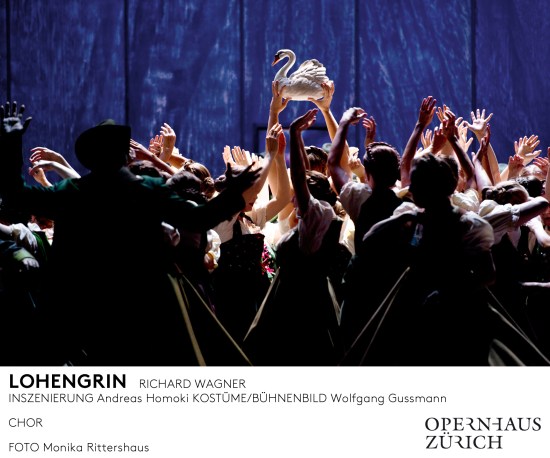
Die Meistersinger von Nürnberg
Deutsche Oper Berlin
29.6.22
In the era of the hyperobject you almost have to salute a production that retains the visual signifiers of Regieoper while narrowing the opera’s scope of meaning instead of widening it, particularly when the work concerned is by the most totalizing composer of them all, Richard Wagner. You almost have to hand it to them. But only almost. Jossi Wieler, Anna Vierbrock, and Sergio Morabito’s Die Meistersinger von Nürnberg is sometimes clever, reasonably entertaining, has a decent take on the ending, and never sets its goals particularly high. The other Wagner director at the DO gives the impression of arriving at rehearsal to announce that “today we are going to see how the forging song would look as staged as Part 2 of Das Kapital.” But rather than read the musical world of Die Meistersinger as an allegory for [whatever], Wieler/Vierbrock/Morabito pop into their Wagner rehearsal and announce that “it’s about singing, actually.”
Their production is set in a modern conservatory run by Veit Pogner, going through a generational shift. The Mastersingers are the teachers, followed around by a group of students. Even Beckmesser, an uptight dork, has his clique. The students react with horror when Pogner announces his plan for Eva, but mostly seem on board with the local method. Hans Sachs is the resident hippie and (I think?) therapist or Alexander Technique instructor or something like that and Walther is the preternaturally gifted student who shows up not having ever had a lesson but somehow is better than everyone else (music students all know that person and we hate them). The prize songs are staged as recognizable music school events, including auditions, masterclasses, and a midnight concert gone wrong (that’s the end of Act 2). The finale seems to be a graduation.

The suggestion that the mastersingers’ pedantic yet still attractive culture is the world of modern classical music itself is an intriguing one. One of the strongest statements on this is made at the very beginning, when the church chorus in the opening is positioned in the boxes around the theater, making it very clear that the characters’ world is ours. Likewise, the set’s mixture of nineteenth-century wood paneling and modern institution suggests a conflict between tradition and change. It is also modeled on a specific Third Reich-era building at the Hochschule für Musik in Munich, adding another element to the traditions that may be being preserved. But while these are all good ideas, they tend to be suggested rather than developed, making things more lightweight that a description would imply.
One thing about Meistersinger is that its text and score are extremely specific, choreographing a lot of action around shoemaking, other gestures, and spaces. Removing the craft element means a loss of that tight relationship between music, text, and action. There are ways to replace it, but this production is too laid-back to have done much. However, having Hans Sachs hand out, of all shoes, Crocs is very funny. The procession at the beginning of the final scene is staged as a nightmare but I wasn’t sure what it was doing.

Despite being undercooked and sometimes conventional, this production moves along quite well and is generally engaging to watch. (I recognize that as someone who works at a music school I may be targeted by a production that is essentially about faculty meeting drama.) It is made very obvious that Eva and Sachs are having an affair, aligning her with the progressive faction of the conservatory and against her father. Since the stakes seemed to have been lowered, I spent a lot of the performance wondering how they were going to stage Hans Sachs’s speech at the ending (the ultimate “this isn’t actually about music” moment), but it actually works out well enough: Eva and Walther nope out of the entire situation, leaving the stage, walking into the auditorium, then out into the lobby while Hans Sachs gradually gains support among the students and then all the chorus, acclaimed not as a dictator but as a populist demagogue.

Musically, this wasn’t an outstanding Meistersinger but it wasn’t bad. John Fiore’s conducting was very smooth and transparent, drawing out the melodic lines and counterpoint rather than the weighty effects and contrasts. Klaus Florian Vogt’s Walther is a very well-known quantity but he was in great voice, sounding a bit darker than he did last time I heard him but maintaining his incredible clarity. He did suffer an error that I’m amazed most Walthers don’t make every time, singing the wrong verse of the Prize Song text at one point (it feels like there are 15 different ones!). It was definitely Wagnerese, the notes were right, but the words weren’t the ones on the supertitles; he looked briefly discombobulated and then figured it out, making this act of composing a little closer to authentic than usual. Another one for the drastic/gnostic files, musicologists.
As Hans Sachs, Johan Reuter wasn’t very vocally imposing and sounded tired by the end, but he’s a smart, interesting interpreter and made a real character. Heidi Stober sounded nice but underpowered as Eva. Ya-Chung Huang was a very tastefully sung, hyperactively directed David. In a typical Berlin arrangement, Philipp Jekal acted Beckmesser and Tom Erik Lie from the Komische Oper sang; Jekal seemed over the top but it can be hard to judge under these circumstances. Lie was very accurate and solid also considering the circumstances.
Based on the cameras I saw all over the auditorium, this production will eventually be on TV or DVD.

















